 An exciting new research project will be launched this Saturday and the team is getting ready. Last November during the ESRC Festival young people told us what they liked doing outdoors. Next Saturday the research team from across BU will be releasing the top ten favourite things that young people enjoyed outdoors on a rock drop in partnership with Bournemouth Rocks. Young people can find out the results of our research and help develop our study by logging their finds and sharing their use of green space with the research team – Dr Holly Crossen-White, Dr Nathan Farrell and Dr Angela Turner-Wilson. The Rock Drop site will be released on Friday on social media (more…)
An exciting new research project will be launched this Saturday and the team is getting ready. Last November during the ESRC Festival young people told us what they liked doing outdoors. Next Saturday the research team from across BU will be releasing the top ten favourite things that young people enjoyed outdoors on a rock drop in partnership with Bournemouth Rocks. Young people can find out the results of our research and help develop our study by logging their finds and sharing their use of green space with the research team – Dr Holly Crossen-White, Dr Nathan Farrell and Dr Angela Turner-Wilson. The Rock Drop site will be released on Friday on social media (more…)
Category / Uncategorized
Catch the Gang of Four postgrads this Wed!

Journal of Banking, Finance and Sustainable Development

Professor Jens Holscher has been invited to join the editorial board of the new Journal of Banking, Finance and Sustainable Development by the editor in chief, Professor Richard Werner (University of Southampton).
CQR Wed Seminar: The Personal Stories of a Methodology Study Group
The Personal Stories of a Methodology Study Group: An independent learning and support mechanism for postgrads
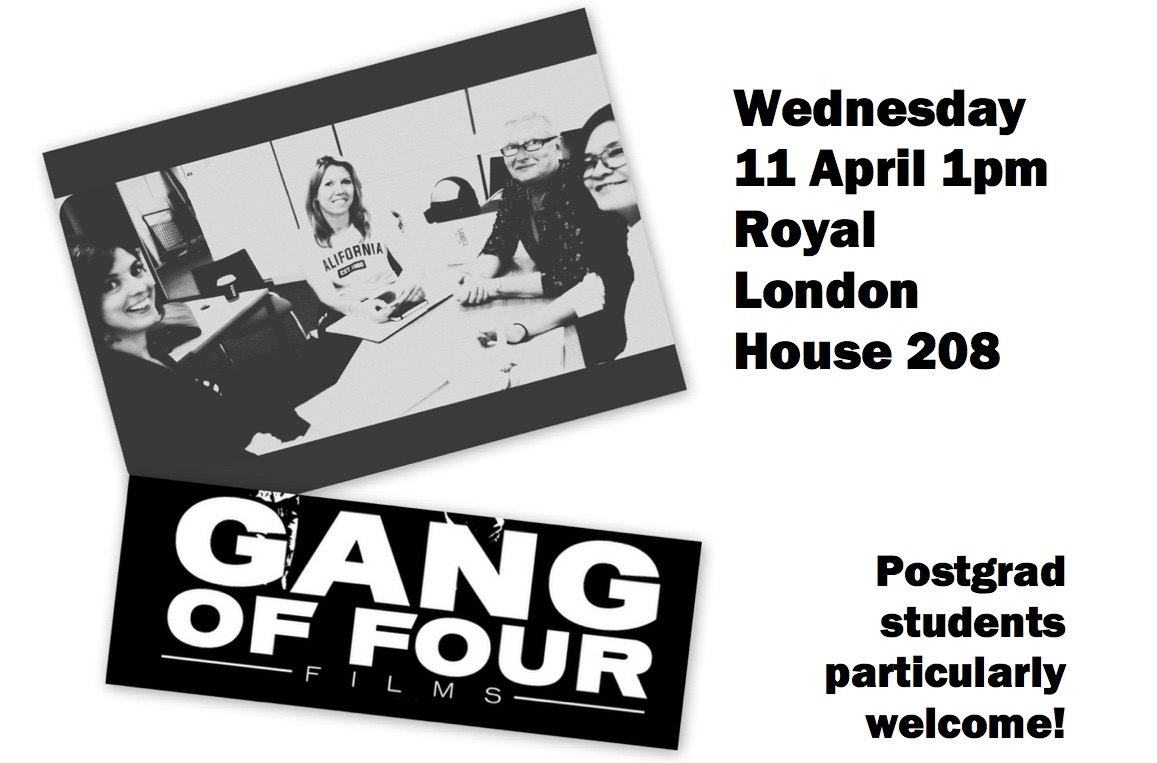
Come along and join in the conversation with the “Gang of Four”: Karen Cooper, Louise Oliver, Mandy Podee, and Jo Thurston.
The result was an enhanced depth of understanding of specific interpretive research methodologies as well as an unexpected support mechanism.
The group’s primary function was to support development of its understanding of methodologies and methods, but an unexpected secondary function was the reduction of a sense of isolation.
United through the fundamental overarching field of narrative research, four doctoral candidates with distinct topic areas were able to collaborate. They not only enhanced their depth of understanding of specific interpretive research methodologies, but also provided support and encouragement to each other within the potentially isolating experience of postgraduate research study.
Centre for Qualitative Research
“In Conversation” Seminar Series

BU PhD Students heading to the British Society of Gerontology Annual Conference in July
Congratulations to Mananya Podee (FHSS) and Yolanda Barrado-Martín (FST)!
Great to see both of your papers accepted meaning that BU research to improve the lives of people with dementia and their families will be presented at the British Society of Gerontology 47th Annual Conference ‘Ageing in an Unequal World: Shaping Environments for the 21st Century’ in Manchester in July.
Mananya from the Centre for Qualitative Research (CQR) and the Ageing and Dementia Research Centre (ADRC) will present a paper on ‘Improving holiday accommodation and service provision for people with dementia’. Yolanda from the ADRC and the Psychology Department will present a paper on ‘How is Tai Chi received by people living with dementia and their informal carers?’ based on her work on the TACIT Trial.
Both studies are searching for more people with dementia and their carers to take part. If this sounds like something you might like to get involved in (or you know someone else that might) please contact them for further information.
- Mandy is looking for people with dementia and carers to talk about holiday experiences in a short interview. For more information please email mpodee@bournemouth.ac.uk
- Yolanda is looking for people with dementia and carers who might like to take part in Tai Chi. For more information please telephone 07801 890258 or email ybarradomartin@bournemouth.ac.uk
Major international conference at BU this week: Psychosocial Reflections on a Half Century of Cultural Revolution
Association for Psychosocial Studies Biennial Conference
5th-7th April 2018, The Fusion building, Talbot Campus, Bournemouth University
‘Psychosocial Reflections on a Half Century of Cultural Revolution: The 50th anniversary of seasons of love and protest’
Keynote Speakers:
Barry Richards (BU), Gail Lewis (Birkbeck) Lynne Segal (Birkbeck) Sally Alexander (Goldsmiths) Liz Frost (UWE)
Join us to reflect on revolutionary relationships and revolutionary politics which challenged authority then and which influence us now.
The cultural forces and the political movements of 1967 and 1968 aimed to change the world, and did so. Recent development of some populist and protest politics could be seen as a continuation of the revolutionary movements in the 1960s. Hedonic themes that recall the summer of love suffuse contemporary life, and self-reflection and emotional literacy have also become prominent values, linked towards human diversity and the international community.
We have over 37 panels that include interdisciiplinary academic papers from renowned international scholars from the spheres of history, politics, feminism, psychoanalysis, sociology and also art, digital media, poetry and social dreaming workshops and film screenings . On Friday evening there is a public engagement Cabaret event with poetry, music and comedy and everyone is welcome!
Here is the conference website:
http://aps2018.bournemouth.ac.uk/
Here is the link to tickets and registration:
The promotional code for BU staff reduced tickets:
BUSTAFFBU18
Hope to see you there and please do circulate to colleagues!
Candida Yates (Conference Chair)
Prof of Culture and Communication, BU
Congratulations to two FHSS PhD students
 Congratulations to two Faculty of Health & Social Sciences PhD students, Preeti Mahato and Elizabeth Waikhaka, who co-authored a paper published in the WHO South-East Asia Journal of Public Health. Their paper is called ‘Social autopsy: a potential health-promotion tool for preventing maternal mortality in low-income countries’.[1] Co-authors include Dr. Puspa Pant from the Centre for Child and Adolescent Health, University of the West of England (Bristol) and Dr. Animesh Biswas based at the Reproductive & Child Health Department, Centre for Injury Prevention & Research, Bangladesh (CIPRB) in the capital of Bangladesh, Dhaka.
Congratulations to two Faculty of Health & Social Sciences PhD students, Preeti Mahato and Elizabeth Waikhaka, who co-authored a paper published in the WHO South-East Asia Journal of Public Health. Their paper is called ‘Social autopsy: a potential health-promotion tool for preventing maternal mortality in low-income countries’.[1] Co-authors include Dr. Puspa Pant from the Centre for Child and Adolescent Health, University of the West of England (Bristol) and Dr. Animesh Biswas based at the Reproductive & Child Health Department, Centre for Injury Prevention & Research, Bangladesh (CIPRB) in the capital of Bangladesh, Dhaka.
The authors argue that verbal autopsy is used to attribute a clinical cause to a maternal death. The aim of social autopsy is to determine the non-clinical contributing factors. A social autopsy of a maternal death is a group interaction with the family of the deceased woman and her wider local community, where facilitators explore the social causes of the death and identify improvements needed. Although still relatively new, the process has proved useful to capture data for policy-makers on the social determinants of maternal deaths. This article highlights the potential role of social autopsy in health promotion.
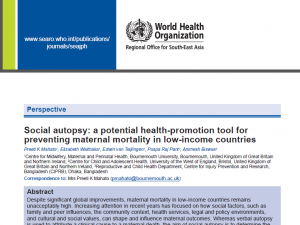
Reference:
- Mahato, P.K, Waithaka, E., van Teijlingen, E., Pant, P.R., Biswas, A. (2018) Social autopsy: a potential health-promotion tool for preventing maternal mortality in low-income countries. WHO South-East Asia Journal of Public Health 7(1): 24–28.
CMMPH PhD student published in BMC Pregnancy & Childbirth
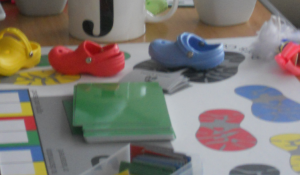 Today BMC Pregnancy & Childbirth published the latest paper by a PhD student at Bournemouth University. Our congratulations go to Alice Ladur in the Centre for Midwifery, Maternal & Perinatal Health (CMMPH), who published `Whose Shoes?’ Testing an educational board game with men of African descent living in the United Kingdom [1]. This paper is based on her PhD research and co-authored with her supervisors.
Today BMC Pregnancy & Childbirth published the latest paper by a PhD student at Bournemouth University. Our congratulations go to Alice Ladur in the Centre for Midwifery, Maternal & Perinatal Health (CMMPH), who published `Whose Shoes?’ Testing an educational board game with men of African descent living in the United Kingdom [1]. This paper is based on her PhD research and co-authored with her supervisors.
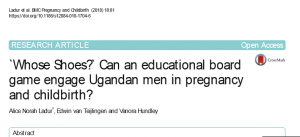 The paper addresses issues around men’s involvement in programmes or interventions aimed at the improvement of maternal health. One such innovative intervention is an educational board game which offers a unique approach to present health information where learning is reinforced through group discussions supporting peer-to-peer interactions. The authors would like to thank Gill Phillips for permission to use the Whose Shoes? board game and all participants for their participation in the PhD study.
The paper addresses issues around men’s involvement in programmes or interventions aimed at the improvement of maternal health. One such innovative intervention is an educational board game which offers a unique approach to present health information where learning is reinforced through group discussions supporting peer-to-peer interactions. The authors would like to thank Gill Phillips for permission to use the Whose Shoes? board game and all participants for their participation in the PhD study.
Alice PhD is focused on Uganda and this particular paper reports a qualitative study with men from Uganda who live in the UK on their views of an educational board game. This pilot study explored perceptions on whether a board game was relevant as a health promotional tool in maternal health prior to implementation in Uganda.

Reference:
- Ladur, A.N., van Teijlingen, E., Hundley, V. (2018) `Whose Shoes?’ Testing an educational board game with men of African descent living in the United Kingdom, BMC Pregnancy & Childbirth 18:81. http://rdcu.be/JXs0
New CMMPH paper accepted in Nurse Education Today
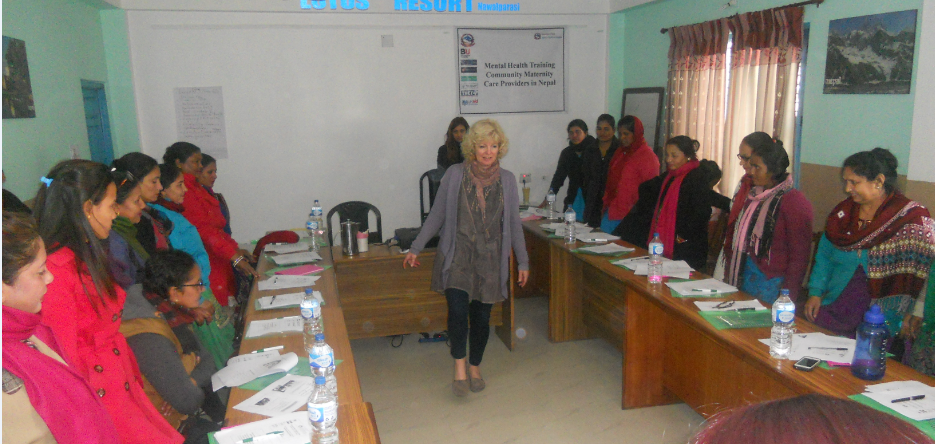 Congratulations to Mrs. Preeti Mahato on the acceptance of her paper ‘Qualitative evaluation of mental health training of Auxiliary Nurse Midwives in rural Nepal’ by Nurse Education Today, an academic journal published by Elsevier. Preeti is currently registered as PhD student in the Centre for Midwifery, Maternal & Perinatal Health (CMMPH). The paper is co-authored by CMMPH’s Catherine Angell and Edwin van Teijlingen as well as BU Visiting Faculty Padam Simkhada and Jillian Ireland. The paper is a result of the evaluation part of the ‘Mental Health Training for Community-based Maternity Providers in Nepal’ project and written on behalf of this THET team.
Congratulations to Mrs. Preeti Mahato on the acceptance of her paper ‘Qualitative evaluation of mental health training of Auxiliary Nurse Midwives in rural Nepal’ by Nurse Education Today, an academic journal published by Elsevier. Preeti is currently registered as PhD student in the Centre for Midwifery, Maternal & Perinatal Health (CMMPH). The paper is co-authored by CMMPH’s Catherine Angell and Edwin van Teijlingen as well as BU Visiting Faculty Padam Simkhada and Jillian Ireland. The paper is a result of the evaluation part of the ‘Mental Health Training for Community-based Maternity Providers in Nepal’ project and written on behalf of this THET team.

Our THET project in Nepal is a collaboration between the Centre for Midwifery, Maternal & Perinatal Health (CMMPH), Tribhuvan University (Nepal’s oldest university) and Liverpool John Moores University (LJMU). The project receives funding from DFID, and is managed through THET and supported locally in Nepal by a charity Green Tara Nepal.
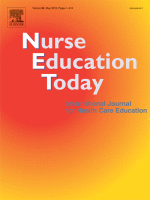
| THET team:
Edwin van Teijlingen, Padam Simkhada, Shyam K Maharjan Preeti Mahato, Bhimsen Devkota, Padmadharini Fanning, Jillian Ireland, Bibha Simkhada, Lokendra Sherchan, Ram Chandra Silwal, Shyam K Maharjan, Ram K Maharjan, Catherine Angell, Flora Douglas.
|
ADRC Research Seminar Series 25/04/18 ‘Ethnography of Hospital Wards for Patients with Dementia, and the Role of Music Within this’ Rosanna Mead
Ethnography of the Environment of Hospital Wards for Patients with Dementia, and the Role in which Music Can Play Within this
Rosanna Mead, University of Exeter
You are cordially invited to this seminar which is open to all BU staff and students.
Wednesday 25th April 2018
2.30 – 4 pm
F307, Fusion Building, Talbot Campus
Abstract
Rosanna Mead discusses her PhD research exploring how music can play a role within acute hospital ward environments for patients with dementia, with a specific focus on agitation and methods to measure levels of agitation in patients with dementia, in relation to environmental factors. She draws on findings from her ethnographic study conducted within two acute hospital wards for patients with dementia, exploring the link between environments and health, considering health/illness states as something which can fluctuate in relation to the environment, and within this gaining a grounded understanding of the interaction between agitation and the environment.
Biography
Rosanna Mead is a PhD Candidate at the University of Exeter in the Sociology Department, under the supervision of Professor Tia DeNora and Dr Hannah Farrimond. She is also the Director of Dorset based social enterprise Musica Music and Wellbeing.
Phase 1 (HR & Payroll) Survey
Please find attached a link to the intranet page which has information about the HR & Payroll project – full name ‘BU2025 Digital Enablers – Phase 1 (HR & Payroll)’
On this page there is a link to a survey which is seeking to gather information about people’s views of the current system and identify areas where improvements could be made.
Link = https://staffintranet.bournemouth.ac.uk/news/news/thismonth/bu2025digitalenablers.php
Can you please:-
- Raise awareness of the project with your various groups of professional services and academic colleagues and share the above link.
- Encourage colleagues to complete the survey (closing date Monday 16th April)
Many thanks
Craig McAulay
abstract submitted

Professors Jens Holscher and Matthias Klaes (University of Buckingham) submitted the abstract below for presentation at the conference of the Association of Heterodox Economics. They want to contribute to the debate of Anne O. Krueger’s review in the Journal of Economic Literature:
Another instance of ignorance towards basic understandings of good scientific practice, is the economists tendency to defend one’s turf against alternative ideas and conceptions instead of trying to constructively engage with what is perceived as “input from outside”. While this tendency is well-known to heterodox economists, a recent instance refers to the broader issue of ethics in economics and relates to a review of the The Oxford Economic Handbook published by the eminent Journal of Economic Literature (JEL)<https://www.aeaweb.org/issues/469>in its book review section. While reviews in the JEL are known to be sharp, this one is especially so, implicitly chastizing the authors as “idealists [that] advocate entirely impractical or unattainable actions” (p. 216). While such a criticism would surely be legitimate in principle, the problem here is that this statement amounts to stark misrepresentation of the books actual content and thereby violates a basic standard of academic conversation, namely not to misrepresent the object of one’s criticism. In this context, I would urge you to have a look at the JEL’s review<http://www.aeaweb.org/issues/469> and the related reply by the Handbooks’s editors<https://econjwatch.org/articles/professional-ethics-101-a-reply-to-anne-krueger-s-review-of-the-oxford-handbook-of-professional-economic-ethics> published in the recent issue of Econ Journal Watch<http://www.heterodoxnews.com/n/htn227.html#art-17592186075082>. Doing so really sharpens the intuition about the degree and intensity of prevailing groupthink in economics, the means and attitudes used to defend this way of thought as well as the biases emerging from such an attitude.
The Krueger Review: Why the Dismal Science Deserves Better Than Dismal Ethics
Jens Hoelscher, University of Bournemouth
Matthias Klaes, University of Buckingham
Abstract
Economists have long held that their discipline is ‘value free’ in the sense that economics is a scientific enterprise that allows the separation of normative considerations from the presentation the findings of economic analysis. David Ricardo, in his Notes on Malthus for example, puts it this way:1 “[I]t is not the province of the Political Economist to advise: – he is to tell you how you may become rich, but he is not to advise you to prefer riches to indolence, or indolence to riches” (Ricardo, 1820[1951], p. 338). In the neoclassical tradition, we have come to know this as ‘positive’ economics, which received perhaps its most influential formulation at the hands of Milton Friedman’s (1953) ‘Methodology of positive economics.’ What is interesting though regarding moral questions relating to economic advice in Friedman’s essay is the explicit juxtaposition of economics as an objective science with the incentive structure of economic debate: “Laymen and experts alike are inevitably tempted to shape positive conclusions to fit strongly held normative preconceptions and to reject positive conclusions if their normative implications – or what are said to be their normative implications – are unpalatable” (ibid.)
Friedman does not explicitly elaborate on these latter points, but his implicit position regarding expert advice is clear from the context: experts should be free from conflicts of interest, and whether somebody is an expert or not can only be judged through the refutable nature of the advice given. Poor expertise will be based on poor intellectual tools of analysis and reveal itself through lack of predictive success, while biased advice will reveal itself in its relation to outside influence. There are thus in Friedman’s essay, implicitly at least, the contours of a call to experts for them to adhere to a kind of virtuous honesty implicit in the enterprise of objective science itself.
We will examine in our paper the bread-and-butter workings of this implicit principle and its strengths and limitations as a foundation for professional economic ethics in the arena of economic expert advice. We will do this two-fold, first by looking at the economist as an expert on what happens in economics, and then at the role of the economist as an expert on what happens in the economy. Krueger’s recent JEL review of the Oxford Handbook of Professional Economic Ethics will serve us as a case study for the former. She reads the Handbook as a ‘series of attacks on mainstream economics and the practice of economics’. We will look at how she could have arrived at such a reading, and what this tells us about Krueger as an expert on what happens in economics. Regarding the role of the economist as an expert on what happens in the economy, we will revisit some deeply troubling implications of what happens if, when looking at the objective function of the cost-benefit analysis of institutional change, we discover human life is at stake in a way that it has been in the context of Eastern European transition.
ADRC Research Seminar Series 25/04/18 ‘Representing Dementia in Film and Fiction’ Dr David Orr and Dr Yugin Teo
Representing Dementia in Film and Fiction
Dr David Orr, University of Sussex and Dr Yugin Teo, Bournemouth University
You are cordially invited to this seminar which is open to all BU staff and students.
Wednesday 25th April 2018
2.30 – 4 pm
F307, Fusion Building, Talbot Campus
Abstract
From something that was ‘not really talked about’ publicly, the last two decades have seen dementia explode into the public sphere and contemporary culture’s creative imaginary. Cinema, documentary, theatre, art, memoirs, biography, poetry, literary fiction and genre fiction have all taken up dementia as a prominent theme. The gerontological humanities have been exploring what these works reveal of the experiences, preoccupations, dilemmas and misapprehensions to which dementia gives rise. This presentation discusses selected examples of engagement with dementia within (1) cinema and (2) crime fiction, asking how these narratives might reflect and shape audience perceptions of living with the condition.
Biographies
Dr David Orr is Senior Lecturer in Social Work at the University of Sussex, where his principal research interests focus on adult safeguarding and self-neglect, global mental health, and representations of dementia in contemporary films and fiction. He has worked on a number of knowledge reviews for the Social Care Institute for Excellence (SCIE) and is co-editor of the Palgrave Handbook of Sociocultural Perspectives on Global Mental Health. Before entering academia, he worked in Community Mental Health Teams in the areas of Adult Learning Disability and Older Adult Mental Health.
Dr Yugin Teo is Lecturer in English and Communication at Bournemouth University. He has previously taught literature and film at the University of Brighton and the University of Sussex where he completed his doctorate. His research on the representation of memory in literature and film has been published in the journals Critique, Medical Humanities and Science Fiction Film and Television. His research monograph Kazuo Ishiguro and Memory was published by Palgrave Macmillan in 2014.
Research Staff Association coffee morning 28/03/18 – theme researcher development
The next BU Research Staff Association coffee morning will take place on the 28th March, 10-11am in F105, Fusion Building, Talbot Campus. The focus is on researcher development at BU. These coffee morning are open to all staff at BU, and we particularly welcome those on research specific contracts including PGRs.
We are delighted to welcome guest speakers Chloe Nevitt and Julia Calleja from the BU Organisational Development team to share their knowledge and experience in this area.
We look forward to seeing you there.
BU Research Staff Association
Research Data Management drop-in session today
There’s a Research Data Management drop-in session today from 11am to 1pm on the Help Zone of The Sir Michael Cobham Library. Pop by with a question or just find out more about the Data Management life-cycle from Data Management Plans to working with your data and sharing your data. Can’t make this time? Take a look at our guide: http://libguides.bournemouth.ac.uk/research-data-management
RePec wp

Professor Jens Holscher co-authored a new BAFES17 RePec Working Paper: https://econpapers.repec.org/paper/bamwpaper/bafes17.htm
International Small Business Journal

Professor Jens Holscher has joined the review team of the ‘International Small Business Journal’.
“When you’re stuck, just narrate” 10 + 1 tips on how to boost your research productivity
A Journalism Research Group research seminar. 3pm – 4.30pm, Wednesday 21 March in WG04.
After years of trial and error, Roman will share some thoughts and tips on how to do research, focusing on the main challenges of staying focused and becoming more productive. He will demonstrate some of the tools and routines he uses to organise his tasks, readings, notes and writing, as well as a few mental strategies on overcoming sticking points. This session is open to all within and outside JEC (including PhD students) but we envisage it as an interactive workshop-type session, in which colleagues will share their own thoughts, anxieties and practical tips.
The session is led by Dr Roman Gerodimos, Faculty of Media and Communication.
What are these sessions about?
They focus on the process of doing research rather than presenting the outcomes. They are less masterclass talks and more quality circles, where we all bring our research questions, dilemmas and dead-ends to the sessions. Whilst there will be someone leading the seminar, they are designed to be participatory.
Spaces are limited, so please email jacksond@bournemouth.ac.uk if you intend to come.
For more information about the Journalism Research Group (JRG) visit the CSJCC website: https://research.bournemouth.ac.uk/centre/journalism-culture-and-community/
All welcome. Hope to see you there.











 FHSS academics teaching in Nepal
FHSS academics teaching in Nepal New weight change BU paper
New weight change BU paper One week to go! | The 16th Annual Postgraduate Research Conference
One week to go! | The 16th Annual Postgraduate Research Conference Geography and Environmental Studies academics – would you like to get more involved in preparing our next REF submission?
Geography and Environmental Studies academics – would you like to get more involved in preparing our next REF submission? Congratulations to three former BU staff
Congratulations to three former BU staff MSCA Staff Exchanges 2024 Call – internal deadline
MSCA Staff Exchanges 2024 Call – internal deadline Applications are now open for 2025 ESRC Postdoctoral Fellowships!
Applications are now open for 2025 ESRC Postdoctoral Fellowships! Horizon Europe – ERC CoG and MSCA SE webinars
Horizon Europe – ERC CoG and MSCA SE webinars MaGMap: Mass Grave Mapping
MaGMap: Mass Grave Mapping ERC grants – series of webinars
ERC grants – series of webinars